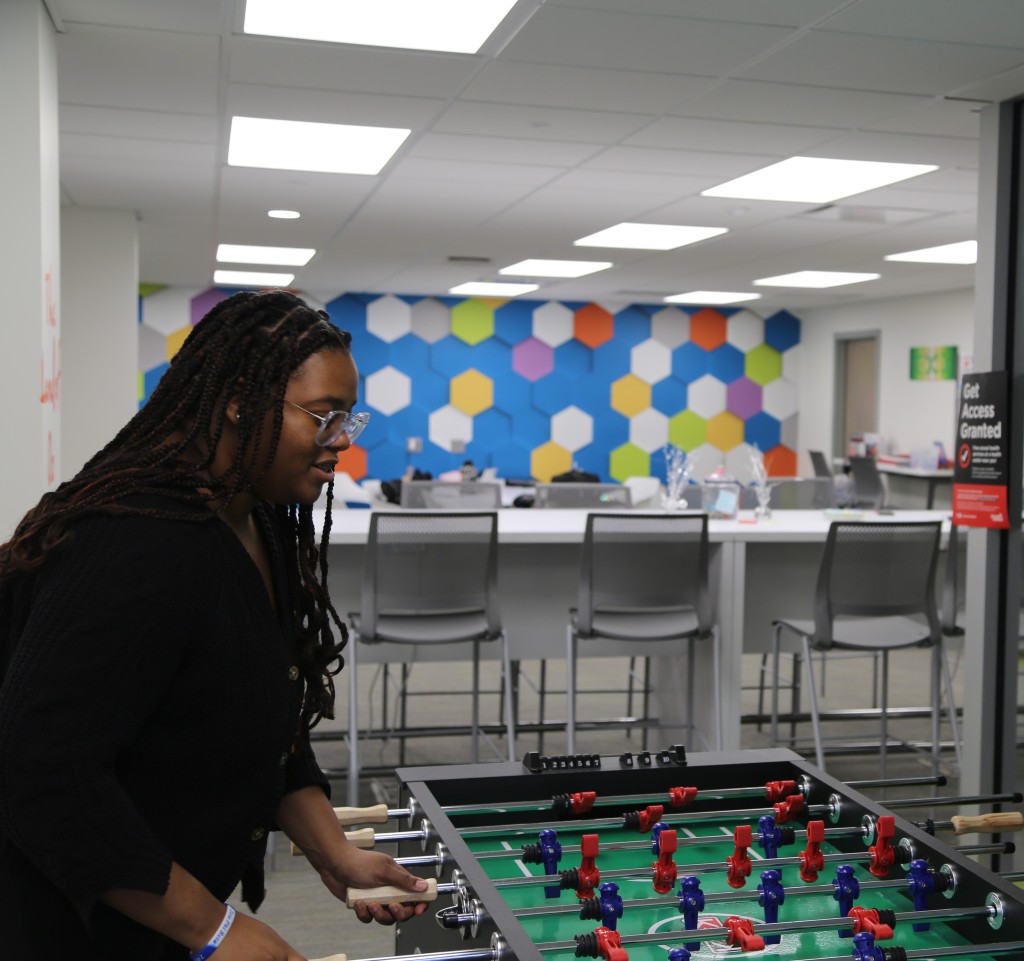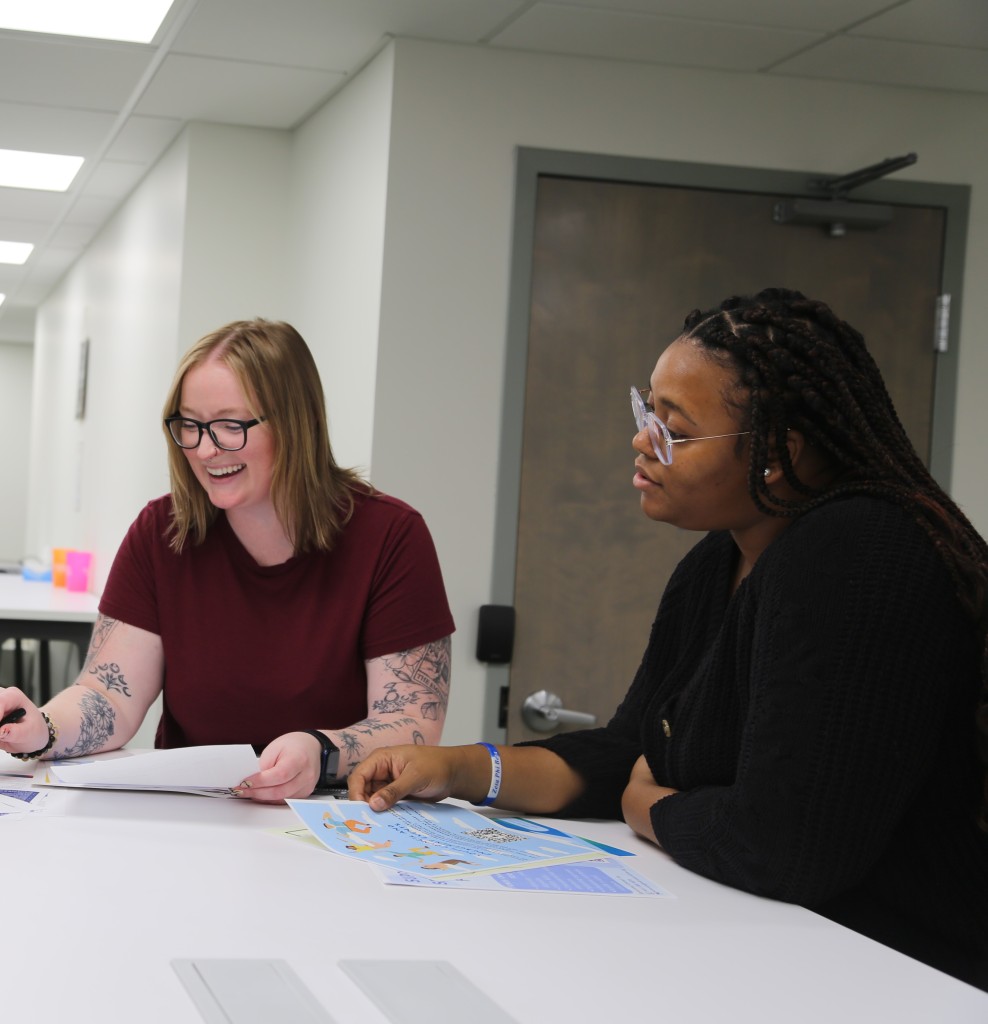
(In some instances names and details have been changed to protect participants’ identities)
Adulting is one of those terms commonly used by Generation Z. Young people are adulting when they perform those mundane but necessary tasks of life like finding a place to live, paying bills, or buying a car. Let’s be honest, most of us started our adulting . . . well, while being adulted. We had parents, grandparents, guardians who taught us how to handle finances, who maybe helped finance things like college or cars or first apartments, who acted as sounding boards when we were struggling to get started as adults. But what about those who don’t have such support?
While many young people use the word “adulting,” the term often feels very different to those who take on its challenges alone. There can be serious consequences to making bad financial decisions early in life or in not knowing how to navigate the world on your own. Marin Johnson and Ja’Nae Smith are two young people who grew up in Omaha and found themselves thrust into independence without the family supports that make the transition easier. As Smith put it, “it’s hard when you don’t have that parental support system.” Had it not been for their discovery of Project Everlast, their journey to adulting might have been quite different.
Project Everlast works with young adults who’ve been a part of Nebraska’s foster system and are transitioning to independence or with those who otherwise find themselves without family support as they become young adults. Project Everlast offers advice and support for starting out, such as educational assistance, financial counseling and incentive programs, help finding affordable housing, and more. One of the less quantifiable but equally important things that the program accomplishes is connecting young adults with a community that can create lasting support networks.
Marin Johnson first encountered Project Everlast through a social work student who was doing a practicum with the organization. Marin, who had been struggling with mental health issues related to gender identity, lived with their mother at the time. Their mother was unprepared to help Marin and put them into the foster system. It was at a group home, that a therapist told Marin that she knew of another biracial, adopted, non-binary person who was a bit older and might be able to mentor Marin. Ironically, Marin, who didn’t take advantage of the introduction at the time, later happened to meet Morgan Taylor, the very person that the therapist had mentioned and who was also the practicum student working for Project Everlast.
In 2016 Marin moved out of foster care and in with their adoptive father, but still struggled with “coming to terms with my gender identity, being an intersectional person in a system that doesn’t really accept people who are marginalized.” They said that “honestly, high school was a challenge and a half.” Marin had attendance and tardiness problems, was eventually placed in a diversion program, and finally went to an alternative School. During this time, Emily Larsen, Central Access Navigator of Project Everlast, reached out to Marin and said, “Hey, you need something right now. What can we do for you?” Project Everlast introduced Marin to events hosted by Fostering the Future, a volunteer group with UNMC partnered with Project Everlast, which offered seminars on financial literacy, nutrition and fitness, and career readiness. The program also cemented Marin’s bond with Morgan Taylor, which they say, “was a pillar in keeping me kind of tethered to getting through high school and becoming an adult.” Marin admits, “I was ready to give up and not invest anything in my own future.” But with the help of Project Everlast, Morgan, the D2 Center, and the alternative school, Marin focused on and achieved high school graduation.
As testament to the power of support and a strong will to succeed, Marin is now in college and says they enjoy community building. Once they age out of Project Everlast (Marin is 21 and the limit for the program is 26), they want to start volunteering for the program. While they finish their degree, Marin works at a local teleservices firm and focuses on self-discovery and healing, noting that “it’s too easy to place who I am behind” work and school.
Like Marin, Ja’Nae Smith found herself struggling as a young adult but for different reasons. In 2016, Ja’Nae started college at University of Nebraska at Omaha. As she puts it, “my parents weren’t financially stable and I was working.” Because her parents were unwilling to help her with the FAFSA (federal financial aid form) and because she couldn’t submit the form on her own without fulfilling certain criteria, Ja’Nae worked at Boystown as a Behavioral Health Technician for the Residential Health Section to try to pay the bills accumulating from college.
In what was supposed to be her senior year, Ja’Nae encountered a number of hardships. First, she had built up $7,000 of outstanding debt to the university and had to move out of the dorms and return home. Second, the car she had purchased to get to school and work was repossessed. Finally, she felt unsupported in her position at Boystown after an incident. On top of all this, she soon found out that she had Type II Diabetes and was anemic from another medical condition.
During this self-described “dark place” in her life, Ja’Nae said that she and her two older sisters as well as a nephew that was living in the household “parted ways” with her parents, a living situation that she called toxic. Ja’Nae said of this period where she lived with her parents and six other children, “there was a lot of arguing, a lot of just toxic energy in the household.” She added that “your parents are your first identity of the world, your first loves.” But Ja’Nae’s parents, according to her, didn’t have the best upbringing which made it “hard to look towards people (her parents) who don’t know how to give you direction as their child.” Eventually, Ja’Nae’s parents threw her, the sisters, and the nephew out of their home and so they moved into a hotel for a short period of time and then they found an apartment.
At this point in her life, Ja’Nae said she “let go of friends and family” and isolated herself. Her financial struggles and other concerns had led to her dropping out of school. Because paying rent was difficult, she searched online for ways to subsidize her payments and found Project Everlast. There she contacted Shelby Wolf a Central Access Navigator for the program, who put Ja’Nae in touch with resources and others who could act as a support system. Ja’Nae admits that when she first emailed with Shelby, she thought that she’d just attend the events where she’d receive a stipend. But after the first event, she enjoyed it so much that she just kept going. Project Everlast helped her with rent, gave her food, and got her connected with Opportunity Passport, a program designed to teach crucial financial literacy skills, and helped her pay off her car through their money match program. Shelby even told her Project Everlast would help her find a new place to live when her current lease expired after Ja’Nae expressed concerns about her living situation becoming unstable. Shelby put her worries of her poor credit rating to rest. As Ja’Nae put it, “Shelby has definitely gone beyond her job in connecting with us.”
With support from Project Everlast and the determination to succeed, in 2023 Ja’Nae returned to college. She is now on track to graduate from UNO in spring of 2024 with a bachelor’s degree in psychology and wants to go on to graduate school after that. Although she will soon be 26, she wants to stay connected to Project Everlast and hopes they will soon establish a planned alumni program.
The fact that both Ja’Nae and Marin want to stay connected to Project Everlast and have found success through its initiatives speaks loudly of how the program fills a void. Ja’Nae said of the split with her parents, “I wish I could talk to them and say, ‘How do I pay the rent?’ . . . to ask my mom, ‘How do I become a woman.’” While Project Everlast can’t and doesn’t replace family, it can act as a support system, a community for those who need it to reestablish themselves and to respark their own inner desires to succeed. To speak with these two young people is to see those who have overcome struggle and found their way into adulthood, who are adulting themselves with a little help from a Project Everlast community who accepts them for who they are.


Leave a comment